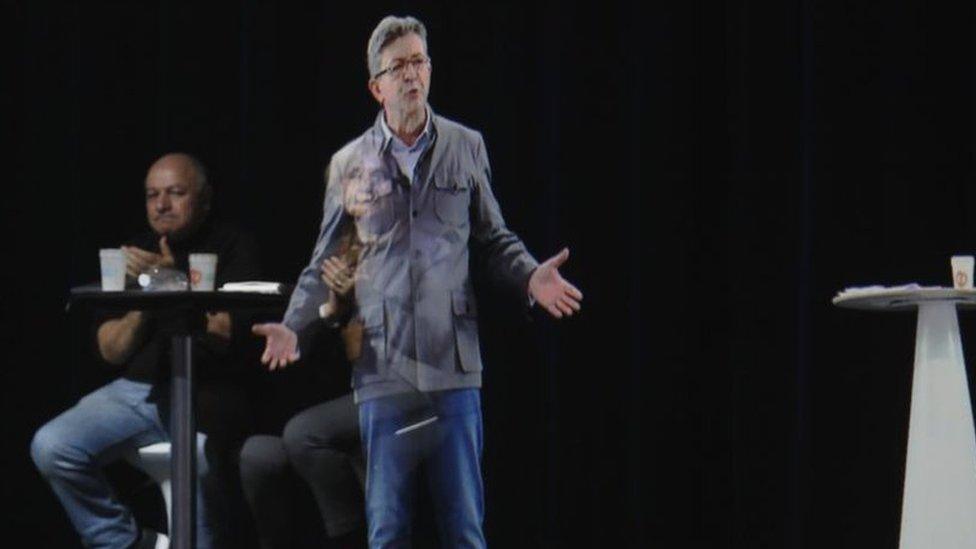Fake news: Five French election stories debunked
- Published
There is little over a month before the first round of the French election. "Fake news" seeking to distort France's political conversation is increasingly seen as a threat to the democratic process.
The BBC is working in collaboration with CrossCheck, external, a journalism project set up by First Draft News, external comprising news organisations around Europe, to verify and debunk fake stories surrounding the upcoming French elections.
Here are five stories news organisations working with CrossCheck have investigated so far.

1. FALSE: Emmanuel Macron's presidential campaign is financed by Saudi Arabia
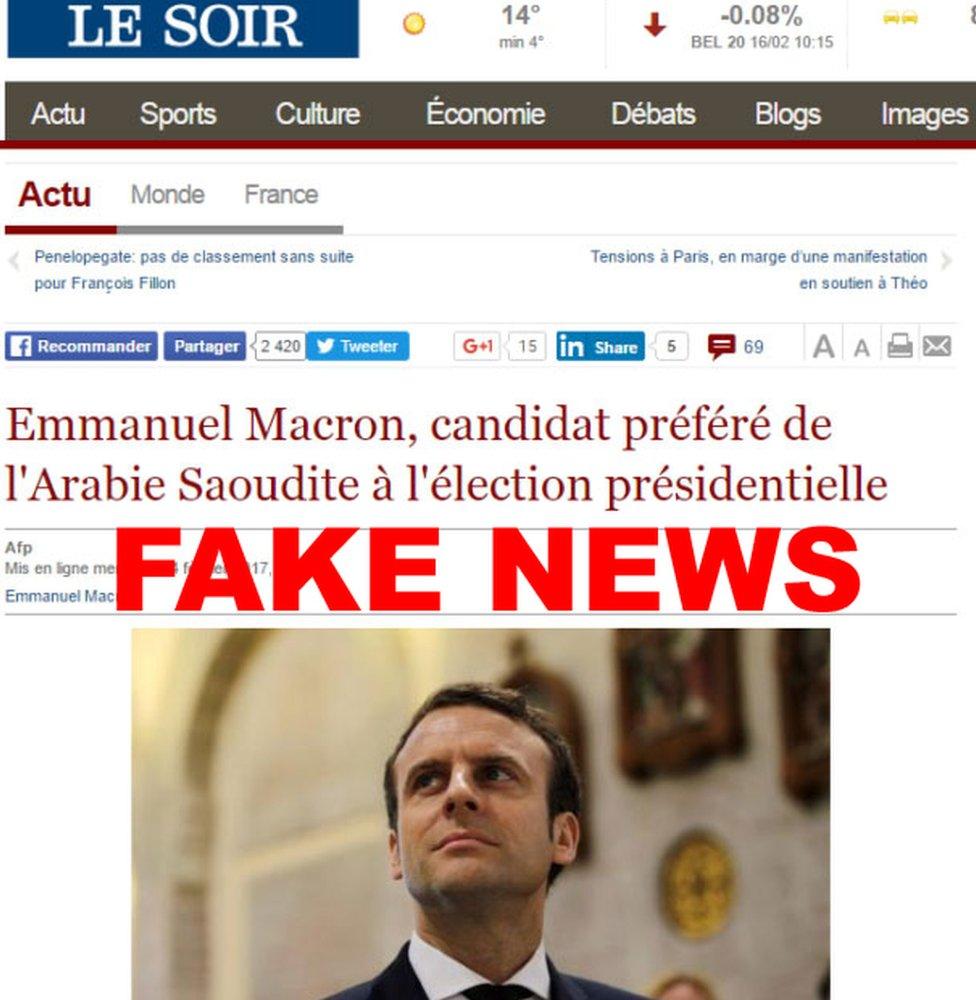
A fake news site registered in the US cloned the website of reputable Belgian newspaper Le Soir to make the false allegations.
DATE OF PUBLICATION: 24 February 2017
IMPACT: The story URL has generated almost 10,000 likes, shares and comments on Facebook
CLAIM: A story shared by Marion Marechal-Le Pen, niece of National Front presidential candidate Marine Le Pen, claimed that the campaign of Emmanuel Macron, a centrist candidate, was financially supported by Saudi Arabia
FACTS: The story is a fake, external. The site it appeared on - LeSoir.info - copied the design and layout of the real Le Soir website - LeSoir.be - to spread false information
When Marion Marechal-Le Pen tweeted "30% of Macron's campaign funded by Saudi Arabia? We demand transparency", she appeared to have a reputable source. Le Soir is a French-language Belgian newspaper founded in 1887.
But she had been caught out by some digital trickery. Someone had cloned the newspaper website to make the story look legitimate and published a false story on a similar domain - LeSoir.info. To further cover the author's tracks, clicking on any of the links on the fake news report page took you to the real Le Soir website. It's unclear who created the false story, but the domain of the fake site is registered to a Donald Thomas in Delaware, United States. Ms Le Pen deleted her tweet.

2. FALSE: This map shows recent violence across France
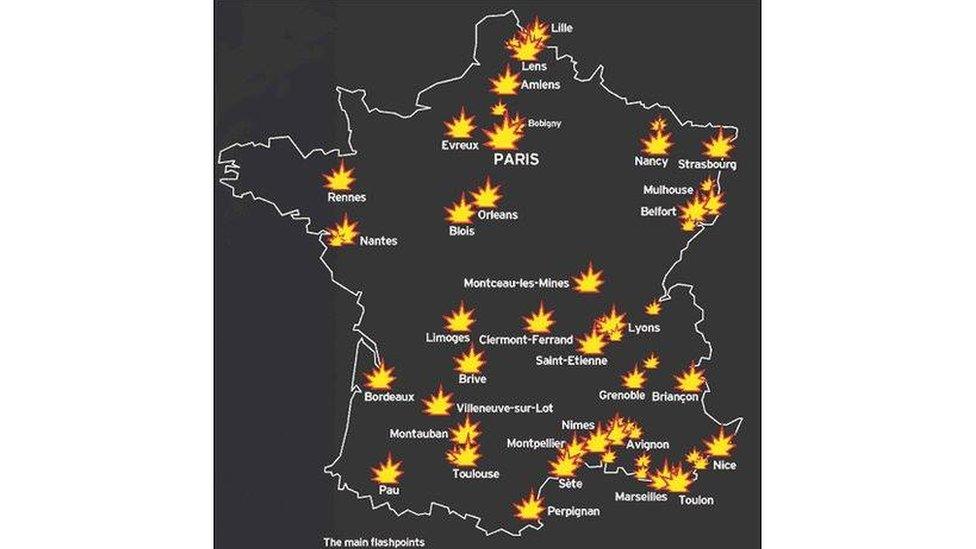
Social media users have been sharing this map, falsely claiming that it depicts recent French rioting.
DATE OF PUBLICATION: Various
IMPACT: The map has been widely shared on social media, garnering thousands of shares and retweets. One Facebook post published on 15 February 2017 has been shared more than 12,500 times
CLAIM: Social media user Bernard Barrier shared the infographic, claiming that it mapped "clashes between the rabble and our police"
FACTS: The map was first published in November 2005, external and is not an accurate representation of the current social tensions in France
After the deaths of French teenagers Zyed Benna and Bouna Traore, in October 2005, France was engulfed in rioting and unrest. A state of national emergency was called as police officers were attacked and over 9,000 cars were set on fire in the suburban "banlieues", often poor areas with large immigrant communities.
The map, which first appeared in a Daily Telegraph article, external on 8 November 2005, to highlight the riots and unrest then, has been shared thousands of times on social media in recent weeks. Far-right accounts have falsely claimed it depicts current rioting in France and have used it to endorse the existence of "no-go zones".

3. FALSE: The French state is going to spend €100 million buying hotels to house migrants
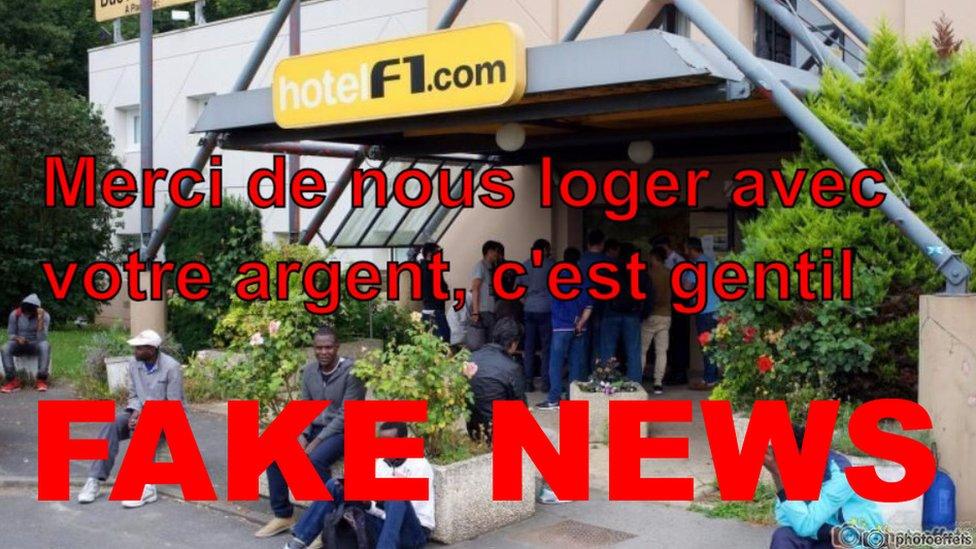
The image text reads: "Thanks for housing us with your money, it's nice".
DATE OF PUBLICATION: 10 March 2017
IMPACT: To date, the story URL has generated close to 10,000 likes, shares and comments on Facebook
CLAIM: Website La Gauche m'a Tuer (which translates as "the left-wing kills me") published a story claiming that the Council of Europe Development Bank (CEB) will lend the French state 100 million euros (£87.3 million) to purchase hotels for housing asylum seekers
FACTS: Two separate news stories have been conflated and altered, external, distorting the truth and exaggerating the assistance available to asylum seekers
Le Figaro reports, external the Accor hotel group is selling 62 of its F1 brand hotels to the Societe Nationale Immobiliere (SNI) a community housing project. SAMU Social, a humanitarian public service offering emergency housing in several cities across France, will refer people who are in need of homes, including asylum seekers, to the project.
Separately, and entirely unrelated, in 2015 a subsidiary of the SNI, Adama, borrowed 100 million euros (£87.3 million) from the CEB. Adama helps people in difficulty, including workers in precarious circumstances, people on minimum social benefits, asylum seekers and migrants.

4. FALSE: Marine Le Pen criticised the "Masha and the Bear" cartoon because the little girl in the story wears a veil

A screenshot of a tweet falsely attributed to Marine Le Pen's account, read: "I am shocked to see that a public channel broadcasts a cartoon whose heroine wears the veil".
DATE OF PUBLICATION: 26 February 2017
IMPACT: A tweet from February was shared over 1,700 times
CLAIM: An anti-National Front Twitter account claimed that French presidential candidate and National Front leader Marine Le Pen criticised a children's cartoon, Masha and the Bear, because Masha wore a "veil"
FACTS: Marine Le Pen did not tweet that - a screenshot of the image is doctored, external. Satirical website secretnews.fr published a 2014 article on the same topic
As Marine Le Pen visited Nantes for a rally in February, a tweet purportedly revealing her criticism of a children's cartoon was spreading on Twitter. But the image was a fake.
The person behind the tweet, who did not want to be named, told Crosscheck it was designed "to demonstrate how easy it is to misinform on Twitter" and that it "was part of the fight against [extreme right groups]".

5. FALSE: The French state is replacing Christian public holidays with Muslim and Jewish holidays
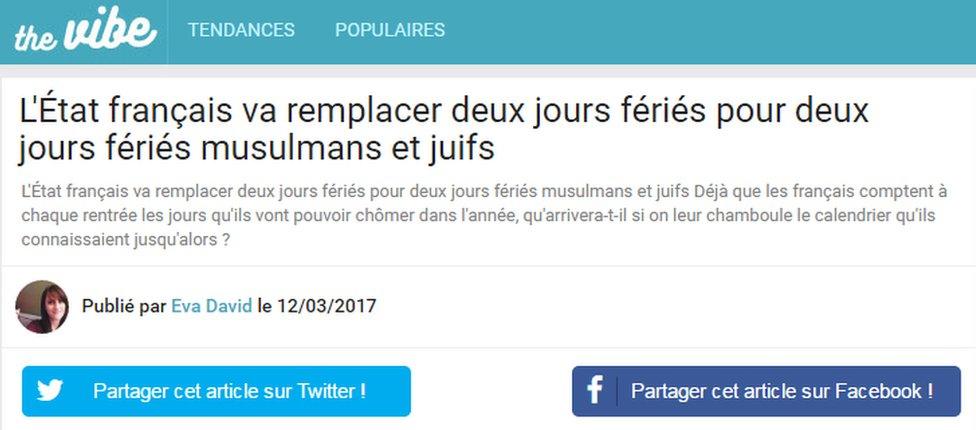
The translated headline reads: "The French state will replace two public holidays with two Muslim and Jewish holidays".
DATE OF PUBLICATION: 12 March 2017
IMPACT: The story URL has generated approximately 6,000 likes, shares and comments on Facebook
CLAIM: Some French websites have run stories claiming that two new Muslim and Jewish public holidays will be introduced
FACTS: The government has never announced such a proposal, external, although a think tank, Terra Nova, has advocated the idea
The introduction of Muslim and Jewish public holidays in France is not a new idea. MEP Eva Joly proposed something similar when she stood as a French presidential candidate representing The Greens in 2012. And a recent report from the think tank, Terra Nova, reignited the debate when it recommended "integrating at least two important dates, Yom Kippur and Eid al-Adha, as public holidays".
However, the government has not announced such a measure and the think tank's recommendations do not have to be adopted.
Chris Bell, UGC and Social News team



- Published14 March 2017
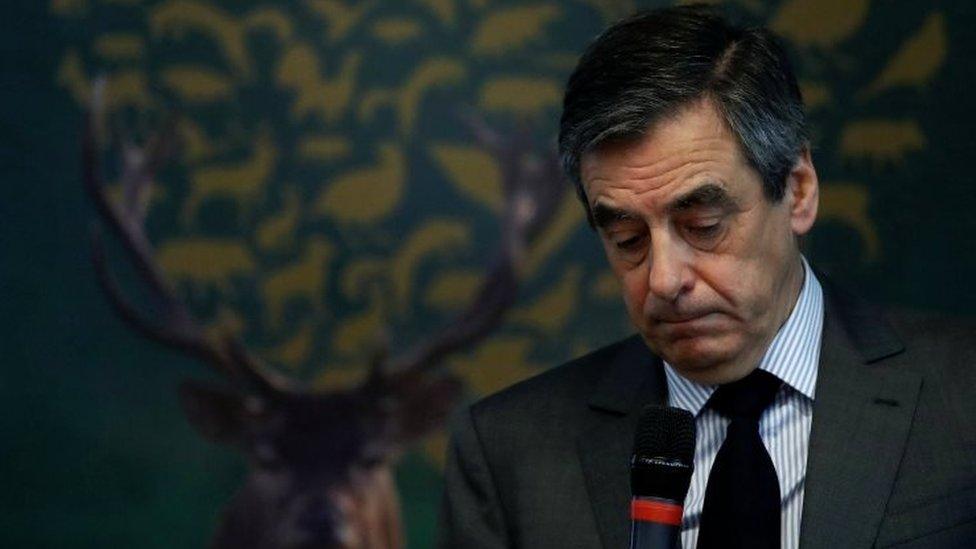
- Published27 February 2017
